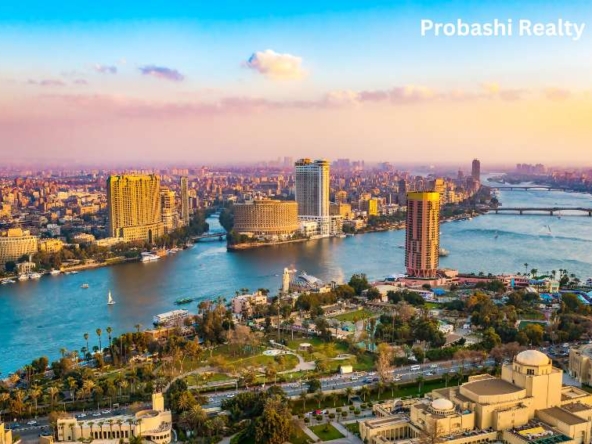Egypt Real Estate market overview
The real estate market in Egypt exhibited several key trends and characteristics:
-
Population Growth and Urbanization: Egypt’s population has been steadily increasing, driving demand for housing and infrastructure development, particularly in urban areas such as Cairo, Alexandria, and the Red Sea coast. Rapid urbanization has led to the expansion of cities and the development of new residential and commercial projects.
-
Government Initiatives: The Egyptian government has implemented various initiatives aimed at stimulating the real estate market and promoting investment in the sector. These include infrastructure projects, regulatory reforms, and incentives for developers and investors, such as tax breaks and land allocation for development.
-
Tourism and Hospitality: Egypt’s tourism industry is a significant driver of the real estate market, particularly in resort areas such as Hurghada, Sharm El Sheikh, and Marsa Alam. Demand for vacation homes, hotels, and resort properties remains strong, driven by both domestic and international tourists attracted to Egypt’s rich history, cultural attractions, and natural beauty.
-
Affordable Housing: Affordable housing remains a priority for the Egyptian government, given the country’s large population and growing urbanization. The government has launched various affordable housing programs and initiatives to address housing shortages and improve access to housing for low- and middle-income families.
-
Foreign Investment: Egypt has attracted significant interest from foreign investors, particularly in the real estate and construction sectors. Foreign investment is driven by factors such as Egypt’s strategic location, growing economy, and government incentives for foreign investors, as well as opportunities in sectors such as tourism, hospitality, and infrastructure development.
-
Infrastructure Development: Infrastructure projects play a crucial role in driving the real estate market in Egypt. Investments in transportation, utilities, and urban development projects improve connectivity, enhance livability, and increase the attractiveness of properties in well-connected areas.
-
Legal and Regulatory Environment: Navigating the legal and regulatory framework for real estate transactions in Egypt can be complex, particularly for foreign investors. Understanding property ownership laws, zoning regulations, and permitting processes is essential for investors looking to participate in the Egyptian real estate market.
-
Commercial Real Estate: Egypt’s commercial real estate market is also significant, with demand for office space, retail properties, and industrial facilities driven by economic growth and urbanization. Cairo, as the capital city and commercial hub, is a major center for commercial real estate investment and development.
Overall, the Egyptian real estate market offers opportunities for investors across residential, commercial, and hospitality sectors, driven by factors such as population growth, urbanization, tourism, and government initiatives to promote investment and economic development. While there are challenges such as regulatory complexity and infrastructure constraints, Egypt’s growing economy and strategic location in the region continue to attract interest from real estate investors and developers.
Egypt Real Estate Tips
Navigating the real estate market in Egypt requires careful consideration of various factors. Here are some tips to help you along the way:
-
Research the Market: Egypt’s real estate market can vary significantly depending on the region, economic conditions, and property type. Research recent trends, property prices, and market conditions in the specific area you’re interested in. Consider factors such as supply and demand, government policies, and economic indicators.
-
Location Research: Egypt offers a diverse range of locations, each with its own unique characteristics and property market dynamics. Consider factors such as proximity to amenities, transportation links, job opportunities, schools, and lifestyle preferences when selecting a location. Popular areas for real estate investment include Cairo, Alexandria, Sharm El Sheikh, and Hurghada.
-
Legal and Regulatory Considerations: Familiarize yourself with the legal and regulatory framework governing real estate transactions in Egypt. Understand the process of buying property, including ownership rights, taxes, fees, and residency requirements. Consider consulting with legal professionals who specialize in Egyptian real estate law to ensure compliance.
-
Budget Wisely: Determine your budget for purchasing property in Egypt, taking into account your savings, income, expenses, and borrowing capacity. Factor in additional costs such as taxes, legal fees, stamp duty, property transfer fees, and maintenance expenses. Consider whether you’ll be financing the purchase through a mortgage or other means.
-
Engage Local Experts: Consider working with local real estate agents, lawyers, and other professionals who have expertise in the Egyptian property market. They can provide valuable insights, assist you with property search and purchase, negotiate on your behalf, and navigate legal and administrative procedures.
-
Due Diligence: Before making an offer on a property, conduct thorough due diligence to assess its legal, financial, and structural aspects. This may include obtaining property title searches, land surveys, building inspections, and reviewing property documents. Consider hiring professionals such as surveyors, engineers, or architects to assist with due diligence.
-
Negotiate Terms and Conditions: When making an offer on a property, be prepared to negotiate terms and conditions with the seller. Consider factors such as the purchase price, payment schedule, deposit amount, and any contingencies. Your real estate agent or lawyer can provide guidance and support throughout the negotiation process.
-
Legal Assistance: Seek legal advice from a qualified Egyptian real estate lawyer before signing any contracts or agreements. A lawyer can review the purchase contract, explain legal terms, and ensure that your interests are protected throughout the transaction.
-
Consider Long-Term Investment: Think about the long-term potential of the property as an investment. Research market trends, rental yields, and potential for capital appreciation in the area. Consider factors such as economic growth prospects, infrastructure development, and demographic trends.
-
Stay Informed: Stay updated on developments in the Egyptian real estate market, including changes in regulations, government policies, and market trends. Follow industry news, attend seminars or workshops, and consult with experts to make informed decisions.
By following these tips and conducting thorough research, you can navigate the Egyptian real estate market effectively and make sound investment decisions.



